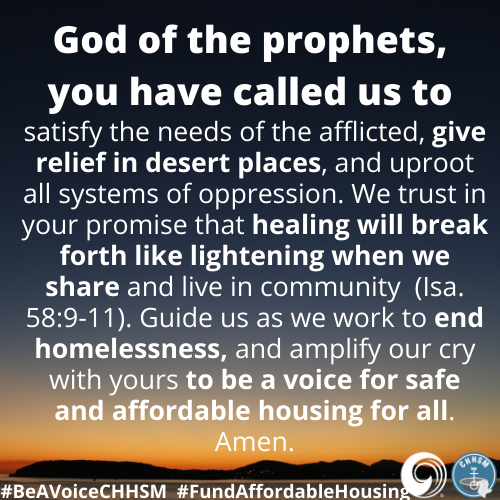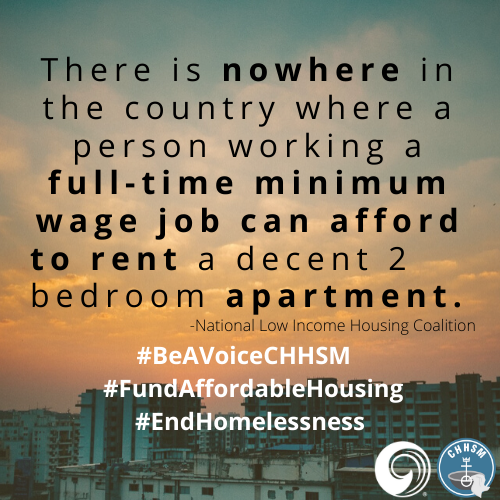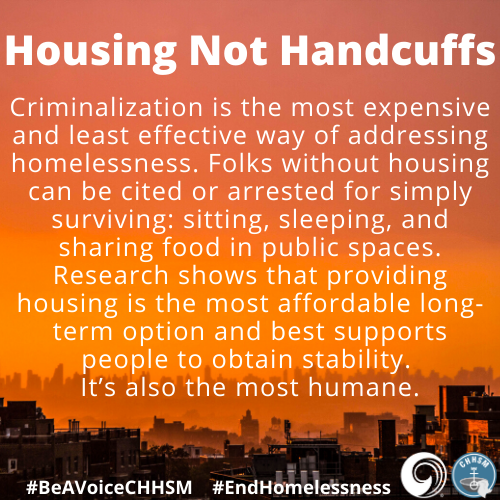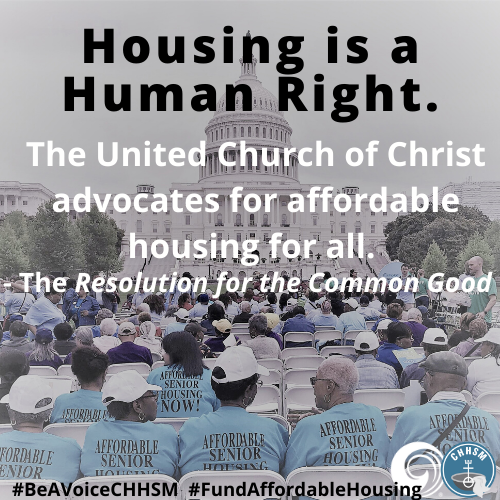CHHSM Advocacy Center
Vol. 2: Affordable Housing and Homelessness
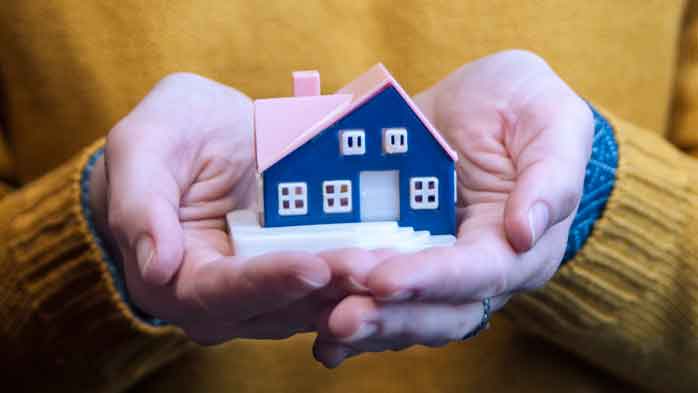
J.T.'s Story
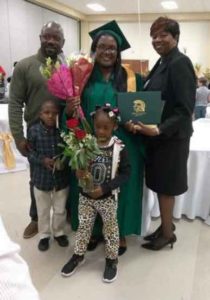
Pictured is J.T. after receiving her high school diploma, with her two children, her mentor from Bridges out of Poverty, and Kenney Washington.
“Being in this program allowed me the time to move from being that ‘troubled child’ to a self-sufficient adult with people who cared about me,” says J.T., who took part in a permanent supportive housing program at Back Bay Mission. In addition to providing housing, this program supports those who also have a history of trauma, mental illness, substance use, and disabilities. Case workers care for their clients holistically and journey with them to realize and achieve their goals. For example, J.T. had been homeless, lost temporary custody of both of her children, and never finished high school. Back Bay Mission provided J.T. with the support she needed to find stability for herself and her family. She was able to regain custody of her children, earn her high school diploma, and is currently preparing to graduate with her Associate’s degree. The staff notes that although J.T. has graduated from their program, she considers them to be part of her family and visits Back Bay Mission often. Those without housing are often silenced and ignored, yet Director of Client Services Kenney Washington believes part of their work is “giving a voice to the voiceless,” and that this is the goal for every person they encounter.
To learn more about CHHSM organization Back Bay Mission, visit thebackbaymission.org.
Background Information
Access to safe and affordable housing is one of the single greatest factors impacting a family’s ability to thrive. Stable housing means economic stability for parents, access to dependable education for children, and increasing economic wellbeing overall. However, right now we face a massive shortage in access to housing, with over 500,000 people who face homelessness each night, and only 1 in 4 families who need assistance with low income housing actually receiving it. The lack of affordable housing means that low-income working families are often paying more than half of their income to rent, having to choose between rent and food, or healthcare, or other essentials. Too many people are living on edge, one minor emergency away from homelessness. The cascade of problems caused by a lack of housing add up quickly: folks aren’t able to find and keep jobs; kids are unable to keep up with school work, or attend school; access to bathing, laundry, and basic hygiene or the ability to prepare nutritious and filling food is severely limited; and there is little to no way to manage a chronic health condition or receive preventative healthcare. This is just a modest list of how lack of stable housing can exacerbate existing issues and cause a whole new set of new ones.
Current Context
Low income housing always gets put at the bottom of the budget pile. For far too long, funding levels have remained below what is needed to help make meaningful strides in homelessness prevention. Nearly one-third of programs that provide for health, education, or low-income housing have been cut by 25 percent or more in the past decade. The recently released president’s budget proposes dramatic and devastating cuts to public housing funding that will intensify the ongoing housing crisis. At the same time, this administration has also released a duet of regulatory rule changes to the Department of Housing and Urban Development (HUD)’s enforcement of the Fair Housing Act. Currently the law makes discrimination based on race, sex, religion, disability, national origin, or familial status prohibited for housing access. Further, it requires entities which receive federal housing funds to “work affirmatively to ensure that people of color, people with disabilities, and others have equal access to housing,” because “the federal government has an essential role in advancing fair access to housing, especially in communities with long histories of racist and discriminatory housing policies and practices.”1 The cuts in public housing coupled with the reduction in oversight of fair housing laws show a clear picture of disregard for meaningful changes to help, not hurt, those in need of fair and equitable housing.
A Faith-Based Response
Since its inception, the United Church of Christ has been committed to economic justice, and in 2014 the UCC Economic Justice Movement was created to strengthen this work. The UCC measures the economy against one fundamental truth: the earth and all that is in it belong to God (Ps. 24:1). God has blessed us with abundance and God’s vision for every one of God’s people, all 7 billion of us, is to live in the fullness of life. God intends for us to fully share God’s gifts (Exodus 16: 16-18), and there is enough for all our needs if we share resources. Still, too many people today are in poverty, and the rising economic inequality further thwarts opportunities to better one’s life and creates an unjust society.
The General Synod has spoken repeatedly on issues of economic justice, particularly naming the essential need for safe and affordable housing. For example, General Synod 29 called on the denomination to support robust funding under HUD for quality affordable housing and for the continuation and strengthening of the low-income housing tax credit program. General Synod 14 urged UCC members to become actively involved in ministries with people experiencing homelessness and to support efforts to lobby for federal, state, and local action in this matter.
Moreover, last year at General Synod 32 Matthew Desmond, author of the Pulitzer-Prize-winning book Evicted, gave the keynote address on the lack of affordable housing in this country and our moral imperative, and ability, to change it: "It's really hard to think of a social policy that does a better job of amplifying our racial and economic inequality than our current housing policy does…If poverty persists in America, it is not for lack of resources…There's no ethical code, there's no piece of scripture, no holy teaching that we can summon to defend what we have allowed this country to become." This 2020 election offers us an important opportunity to be part of the movement for meaningful, structural change and to respond to the biblical mandate to care for the “least of these” (Mt. 25:40).
Questions for Candidates
We know that equitable and affordable housing is a critical foundation for helping families thrive. Through increased housing assistance, vigorous enforcement of fair housing practices, and models that prioritize housing access, we can make strides toward ensuring everyone has safe and stable housing.
- The affordable housing crisis continues to expand, meaning millions of families are struggling to pay rent, with many others unable to access housing or receive assistance. What plans do you have to address the backlog in affordable housing assistance?
- The gap between the increase in rent vs the increase in wages keeps widening. What measures will you enact to ensure that people don’t have to make the choice between buying food or medicine and eviction?
- Rollbacks in regulations that ensure strong enforcement of the Fair Housing Act will increase discriminatory housing practices and amplify the inequities caused by lack of access to safe and stable housing. Will you ensure that the Fair Housing Act is enforced by not just maintaining, but by continually improving the methods by which fair housing standards can be prescribed?
Social Media Samples
Research has shown that when families have stable, decent, and affordable housing, they are better able to find employment, achieve economic mobility, perform better in school, and maintain improved health. Call on those running for office to #FundAffordableHousing in 2020. #BeAVoiceCHHSM #EndHomelessness #HealthEquity
You can find the above graphics and more by following CHHSM and JWM on social media.
Follow the UCC’s Council for Health and Human Service Ministries (CHHSM) at:
Follow the UCC’s Justice and Witness Ministries (JWM) at:
More Information
For additional information on affordable housing and homelessness, check out these resources:
- Evicted: A Faith-based Reading Group Guide, by Matthew Desmond
- Ending Poverty: A Christian Social Contract for Our Times, by Justice and Witness Ministries, UCC
- Housing Not Handcuffs: Ending the Criminalization of Homelessness in U.S Cities, by the National Law Center on Homelessness and Poverty
- 2020 Affordable Housing Policy Priorities, by Leading Age
- 2020 Community Discussion Guide, by Housing Now
CHHSM Organizations in Affordable and Transitional Housing
Click on these links to view a complete list and map of CHHSM members involved in this work. There are 321 CHHSM affordable housing facilities throughout the country.
Where to Find Us
Please visit our websites to learn more about CHHSM and JWM.
1 Bailey, Peggy. "Trump Administration Rule Would Reverse Communities’ Progress Toward Meeting Fair Housing Obligations." Center on Budget and Policy Priorities. Last modified January 7, 2020.

